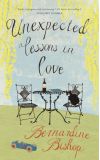
23 Jan 2013 18:08:57
Cecilia is in her 60s, a cancer survivor living with a colostomy and an unhealed wound where the cancer was, where the radiotherapy did its drastic work. As one disconcerting sentence puts it, "She could not help wondering what had happened to her vagina." Even so she hasn't altogether ruled out the resumption of a sex life. Advertisers talk about the USP, the Unique Selling Point. This is a book with four powerful anti-SPs – mortality, disfigurement, "female troubles" and sex in later life. All the more impressive that it offers such a rich range of pleasures.
Cecilia has made a friend at the colostomy clinic, Helen, with whom she can exchange both technical tips and informed grumbles. The friendship would be a weak device if it wasn't so strongly developed. The women are well matched, Cecilia a retired psychotherapist (Bishop's own status), Helen a novelist with a block. By temperament and professional reflex Cecilia considers the broadest possible picture, which makes her generous and far-seeing but leaves her vulnerable to the residue of egotism that can't be sieved out by the mind working on itself. Helen has her raffish and unscrupulous side but is also capable of engineering her own breakthroughs of insight, and of looking at her blindnesses square on. She is much more of a voyeur than Cecilia. This has the compensation of tempting her less to intervene.
Much of the action of the novel follows the arrival in Cecilia's family, and soon in her keeping, of an abandoned baby, Cephas. The pathos of the set-up is so obvious that only a brilliantly realised baby could transcend it. Luckily Cephas is a fully drawn character, on a par with any baby in literature. His first encounter with Cecilia's cat, Thor, is particularly memorable.
Cephas's psychotic mother, Leda, destabilises almost everyone she meets. At first she seems almost an embodied plot mechanism, but as the book goes on Bishop explores her psychology more and more deeply, following her from the unbearableness of delusion to the unbearableness of recovery. The effortlessness with which every corner of the novel is filled out is reminiscent of Penelope Fitzgerald. It is never a bad thing to be reminded of Penelope Fitzgerald.
One of the book's triumphs is a sidelong portrait of Cecilia's good but quiet marriage, asymmetrical but not unbalanced. It's the sort of relationship that would seem to outsiders to have been left on a back burner for so many years it must have boiled dry long since. Fluidly contrasted with it is the marriage of Leda's parents, which seems to be a bad though quiet one, with no detectable overlap of personality, until it is bruised into life by the strains imposed by their daughter's recovery.
Bernardine Bishop's irony is unusual in type, because it is infused with warmth (most modern irony is cold, or smug, or both). Even the characters who might seem to invite it escape skewering. Leda's unbending father, for instance, is embittered because he left the army with only the rank of major, and also because of the poor prospects of grandchildren, since "Bruce is as queer as a coot and Jane is off her head". It's mentioned only in passing that Bruce, following his father into the military, has made colonel. Outranked by his gay son! Bishop has the grace to leave as an incidental piece of psychological comedy something that others would be tempted to turn into a big revelation, if not a TV series.
A characteristic piece of dialogue in the book goes like this. "'My word,' said Helen to Cecilia, 'that will be a dramatic event.'
'It might be. I hope it will be very tame.'"
The ability to build tension, to move towards the big scene, is a significant and routinely admired part of the novelist's craft. More valuable is the ability, shown a number of times in Unexpected Lessons in Love, to make anti-climax sing. There's plenty of drama here (at one point Cecilia's son becomes the main item in the news), though it never moves predictably. It's not simply underplayed but syncopated in the handling.
Much that passes for tame has really only been drowned out by brasher, more self-important voices. It seems silly to say that Cecilia's recessive husband, Tim, has a big moment in the book (it's on page 143), when all it amounts to is putting some food in front of her at a moment of crisis, though she says she's not hungry, and then, when she says, absent-mindedly, "I meant to have some salad with this", bringing her back to the business in hand with the words "Too bad." I can't help that. It's a big moment just the same.
Leda's faded, careworn mother takes refuge in her garden in the early mornings, admiring the spiders' webs and above all the snails, not just "the large, established ones who had survived several winters" but "the smaller, excited ones whose first summer it was". It's a special kind of novelist that can respond to the excitement of a snail.

